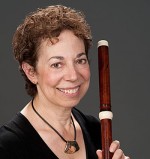Column Name
Title
Flutist Sandra Miller, one of the inaugural members of the Historical Performance faculty, was born in Philadelphia and grew up there and in North Carolina. A year or two after graduating from Curtis, she rented a Baroque flute for the summer. For many years, she performed on both flutes—sometimes even in the same recital—but then the balance of her touring and freelance activities changed and her activities shifted toward the Baroque flute. Sandra, who joined the Juilliard faculty in 2009, has also taught at SUNY Purchase, Hunter, the CUNY doctoral program, Mannes, New England Conservatory, and Case Western Reserve.
Body
What was the first recording that you remember hearing or buying?
The story goes that my father (who was not a musician) would play a recording of the Beethoven Sixth Symphony to help me stop crying when I was an tiny infant. (He also held me so that I could watch the turning disk over his shoulder.) It worked, although I’m not sure if it was the music or perhaps the quasi-hypnosis from watching the record turn!
When did you know you wanted to be a musician?
I started playing the flute in second grade after seeing a classmate’s older sister playing one. I became obsessed with the instrument, dreaming about it and pestering my parents about how much I wanted to play it. I decided for sure that I wanted to be a musician sometime in junior high school, while listening to some of my father’s LPs, I think. The music (perhaps the Beethoven “Emperor” Concerto?) was so beautiful I knew I couldn’t live without it.
Who was the teacher or mentor who most inspired you?
My flute teachers were excellent musicians, but I think my most inspiring influence was Robert Levin, with whom I studied solfège, harmony, and analysis at Curtis. My study of 18th- and 19th-century repertoire in those classes was all-encompassing and fascinating—I learned to hear and understand music in an entirely different way.
What’s the most embarrassing moment you’ve had as a performer?
Showing up for a concert without my flute. I had been warned that I would have a terrible time at this particular venue, and I must have incorporated that into my packing routine. I had time to drive home (100 miles) to get my flute, but then I went on stage missing the centerfold pages of the Poulenc Sonata. I was able to finish it from memory, but this remains my most memorable Freudian slip.
What’s the biggest difference in playing Baroque and contemporary flute?
Approximately 50 percent of the fingerings are different, but the unevenness of the scale (some pitches are very pale in color) and different styles of articulation make the greatest difference, I think.
If you could have your students visit any place in the world, where would it be?
My favorite places to visit have been botanical gardens (the Huntington Library, in Pasadena, for example) and large cities (Hong Kong, London, Paris, Florence). I don’t know whether others would enjoy these to the same degree I have, however, and there are still places—Alaska, for example—that I’d love to visit just for the scenery.
What are your nonmusic interests or hobbies?
Gardening, cooking, quilting and knitting, bicycling.
What would people be surprised to know about you?
I’m an extremely competitive duplicate-bridge player.
How has your teaching changed over the years?
I think my teaching has become more interactive, with more open-ended questioning of students. And I’m a firm believer in the “it’s all about the bass” philosophy for interpreting Baroque music. Much of what a performer needs to consider in presenting a work can be found in the bass line, much more so than in the melody. The form and the harmonic tension are already in place, and need only to be projected and shared, rather than designed, in this repertoire.
What book are you reading?
After recommendations from a number of people, I’m reading Evening in the Palace of Reason by James R. Gaines. I enjoy the historical facts, which I’m hearing for the first time, and the contrasting of old and new philosophical thought. But there’s less about the music in their lives than I’d expected. I’m halfway through.
Do you follow any social media?
No.
If you weren’t in the career you are in, what would you be doing?
I’m not sure what I would do. I enjoy solving problems, doing puzzles—favorites are free-cell solitaire, sudoku, and even jigsaw puzzles. I like determining efficient methods for doing things better, kind of like practicing, so I guess it would be something where thinking about effective solutions is a large part of the work.





